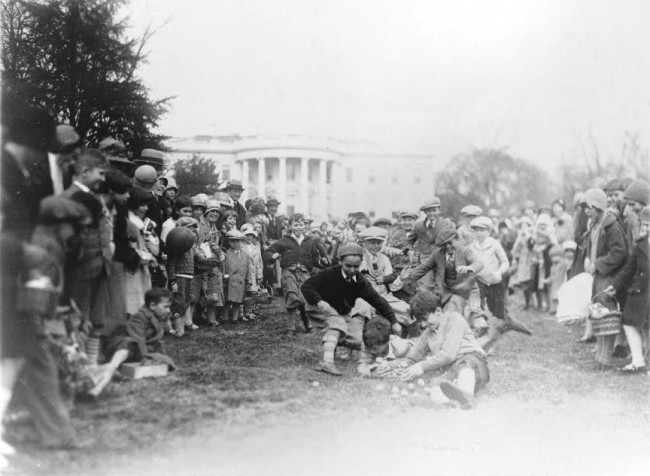Ceistiúchán Cásca — An Easter Quiz in Irish (Fill in the Blanks) Posted by róislín on Apr 3, 2015 in Irish Language
(le Róislín)

Rolladh Uibheacha Cásca ag an Teach Bán i Washington DC. Cén bhliain é, i do bharúil? Freagra san aimsitheoir aonfhoirmeach acmhainne, .i. san URL. NB: Ní hionann rolladh uibhe agus rollóg uibhe (bia Shíneach!). Fearann poiblí (http://commons.wikimedia.org/wiki/File%3AEastern_roll_eggs_in_the_White_House_in_1929.jpg)
In this blog, we’ll look back at some terms introduced in previous write-ups about Easter (An Cháisc) in this series. There will be some phrases to fill in using téarmaí Cásca.
Remember, the Irish word for “Easter” has three main forms, and each of these can be subject to further changes (lenition, eclipsis). While the underlying word is “Cáisc,” the subject form is almost always:
An Cháisc [un khawshk], lit. “the Easter.” Like “An Nollaig” (Christmas), the Irish word for the holiday takes the word “the” in front, most of the time (but not all the time!).
The other two typical forms are:
Cásca, of Easter, and “na Cásca,” which also means “of Easter”
And there’s a plural:
Cáisceanna [KAWSH-kyuh-nuh], Easters. Admittedly, we don’t use the plural very often, even in English, probably, but there could always be phrases like, “Of all the Easters I remember, ….”
And here are the remaining forms which might occur in specific phrases:
gCáisc, Chásca, and much less commonly: gCáisceanna, Cháisceanna
In the second half of this blog, we’ll look at some days of the week connected to Easter besides Sunday, since there is a special designation for the days leading up to the holiday, and for several days after. But we won’t go as far as the terms for 50 days before and after Easter, at least not in this blog!
So, let’s get started with some phrases. Freagraí thíos, and also, note that I’m not putting in the exact number lines for letters or words, just one long-ish line, so the dúshlán [doo-hlawn], will be a little greater. You’ll have to decide whether to include “an” or “na“:
1) Beannachtaí __________
2) ubh _________________
3) ciseán _______________
4) aimsir _______________
5) Oileán _______________
6) Éirí Amach ____________
7) Mion-________________
8) uan _________________
9) tine _________________
10) uibheacha ____________
And now for some related terms that don’t use the word “Easter” as such in English or in Irish. These are roughly in chronological order, leading up to Easter.
Here’s a word bank for the answers, but remember, most of them change form, either at the beginning or the end of the word, or both: pailm, An Inid, céasadh, luaithreach, mandáil, and spiaire (terms given in random order). Watch out for mutations and case endings!
I’ve filled in definite articles (“an,” “na“) where they apply:
11) Domhnach na _____________________ (Shrove Sunday)
12) Máirt ________________ or Máirt na ______________ (Shrove Tuesday aka Mardi Gras aka Pancake Tuesday). For this term, I’ve seen both the form with the definite article (“the”) and without it.
13) Céadaoin an ______________________ (Ash Wednesday)
At this point the calendar, we see the beginning of An Carghas (Lent; notice that “Carghas” is preceded by “an“)
14) Domhnach na __________________ (Palm Sunday)
15) Céadaoin an ___________________ (Spy Wednesday)
16) Déardaoin ______ OR Déardaoin na________ (Maundy Thursday; again, both forms exist)
17) Aoine an _______________________ (Good Friday)
And now a couple of remaining terms that do include the word “Easter” in Irish:
18) Satharn ________________________ (Holy Saturday)
19) Domhnach _____________________ (Easter Sunday)
20) Luan __________________________ (Easter Monday)
21) Máirt _________________________ (Easter Tuesday, admittedly not so widely recognized, but it is designated).
Hope you enjoyed that. SGF – Róislín
Freagraí
1) Beannachtaí na Cásca: Happy Easter (lit. the blessings of Easter)
2) ubh Chásca: an Easter egg
3) ciseán Cásca: an Easter basket
4) aimsir na Cásca: Eastertide
5) Oileán na Cásca: Easter Island / Rapa Nui)
6) Éirí Amach na Cásca: the Easter Rising (1916)
7) Mion-Cháisc: Low Sunday
8) uan Cásca: Paschal lamb
9) tine na Cásca: Paschal fire
10) uibheacha Cásca: Easter eggs
11) Domhnach na hInide: Shrove Sunday
12) Máirt Inide or Máirt na hInide: Shrove Tuesday
13) Céadaoin an Luaithrigh: Ash Wednesday; remember, “‘luaithreach” is a collective noun, so it means “ashes” and “luaithrigh” means “of ashes”
14) Domhnach na Pailme: Palm Sunday
15) Céadaoin an Spiaire: Spy Wednesday
16) Déardaoin Mandála OR Déardaoin na Mandála: Maundy Thursday (“mandála” is the genitive case of “mandáil,” which means ‘mandate’ — so no relation to the “mandala” — note: no long mark — of Búdachas and Hiondúchas)
17) Aoine an Chéasta: Good Friday
18) Satharn Cásca: Holy Saturday, lit. Easter Saturday; this can also be “Satharn Naofa,” or in older spelling “Satharn Naomhtha” but using “Cásca” seems to dominate
19) Domhnach Cásca: Easter Sunday
20) Luan Cásca: Easter Monday
21) Máirt Chásca: Easter Tuesday

Build vocabulary, practice pronunciation, and more with Transparent Language Online. Available anytime, anywhere, on any device.




Leave a comment: